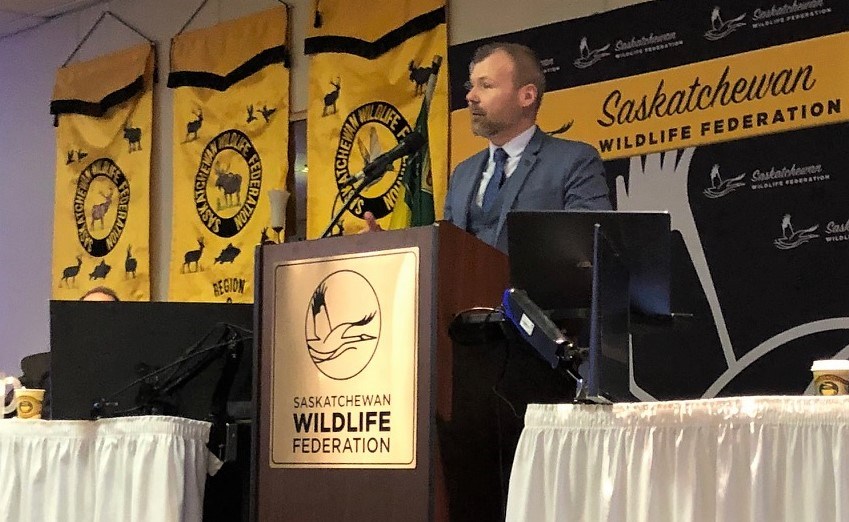The Sask Party is set to announce an innovation challenge to address how hunters and other members of the public can navigate the province's changes to the trespassing act.
The Saskatchewan government has tabled legislation to change the province's trespassing act, requiring those who wish to hunt or snowmobile on rural property to seek permission first before entering the land.
Friday at the Saskatchewan Wildlife Federation's 90th annual convention, provincial Minister of the Environment Dustin Duncan announced that Innovation Saskatchewan will be holding an innovation challenge to find innovative ways for the public to get land owner's consent to access their land should the changes to the trespassing act pass in the legislature in the spring session.
"As a government, we would like to tap into the ingenuity of the Saskatchewan people to come up with a technological way to make it easier, faster and more convenient to get land owner's consent," Duncan said. "This will take the form of an innovation challenge. The government will, in the coming weeks, pose a question to the Saskatchewan public calling on our province's entrepreneurs, innovators, students, technology experts and researchers to submit their best technology ideas to tackle this challenge on how to make it easier to get consent."
The winner of the innovation challenge will receive a $10,000 prize and a 16-week residency within government, or its partners, to develop a prototype of the technology. Details of the challenge and a deadline for submissions will be announced in the coming weeks.
"We've done two of these through Innovation Saskatchewan in the last year or so," Duncan said. "It's basically just posing a question to anybody who wants to provide a technology solution to a problem we have as government. We've done this on rural crime in the past.
"People have identified a concern of how they're going to contact or find the contact information for the land owner, to be able to get that consent. We think that there might an applicable technology solution to help that out."
As the act stands now, consent is presumed to have been given unless a land owner posts a sign on their land explicitly stating that they either do not want anybody accessing their land or that permission is needed to be gained.
"We're just reversing that onus to say that regardless of whether a land owner posts their land that the hunter -- the person who is wanting to access the land -- it's their obligation to now go out and ensure they consented with the land owner before they're on the land," Duncan said. "Which is really best practice. Even the Saskatchewan Wildlife Federation encourages their members to get consent, even if it is unposted land, they should still do the right thing and be a good a neighbour and a good hunter and seek the access to the land."
Saskatchewan New Democratic Party MLA Trent Wotherspoon, who is a member of the SWF and said he has hunted and fished his entire life, was in attendance. He feels that the majority of hunters and people that access lands are good stewards and the proposed legislation doesn't address the real issues.
"The people in this room -- hunters and fishers across the province -- have always worked to maintain relationships and permission wherever possible in this province," Wotherspoon said. "The changes brought forward by the Sask Party simply doesn't make sense.
"Certainly it's very important that a land owner has the right to control access to the land and to be able to post that land, but the current legislation that has been brought forward by the Sask Party would be devastating to this heritage industry in the province. It's not enforceable and not a fix to the real problems that exist around rural crime and clubroot."
The proposed changes cover three separate acts — The Trespass to Property Act, The Snowmobile Act and The Wildlife Act — and those changes are still a bill before the assembly. The legislation still has to pass before the house.
Before it can pass, the proposed changes may have to withstand a legal challenge from the Federation of Sovereign Indigenous Nations who believe the legislation infringes on existing treaty rights.
Wotherspoon is hoping to see the changes amended that merely requires permission for vehicles to access private land.
"There is very reasonable consideration that could be given to ensuring permission for any vehicle to access land," Wotherspoon said. "That would respond directly to concerns about rural crime and respond directly to clubroot concerns. That would include trucks and cars, but also snowmobiles and ATVs. I think it's fair that permission be required to take a vehicle on, but I think hunting on foot could be an important amendment to this legislation."
"We've done two of these through Innovation Saskatchewan in the last year or so," Duncan said. "It's basically just posing a question to anybody who wants to provide a technology solution to a problem we have as government. We've done this on rural crime in the past.
"People have identified a concern of how they're going to contact or find the contact information for the landowner, to be able to get that consent. We think that there might be an applicable technology solution to help that out."




